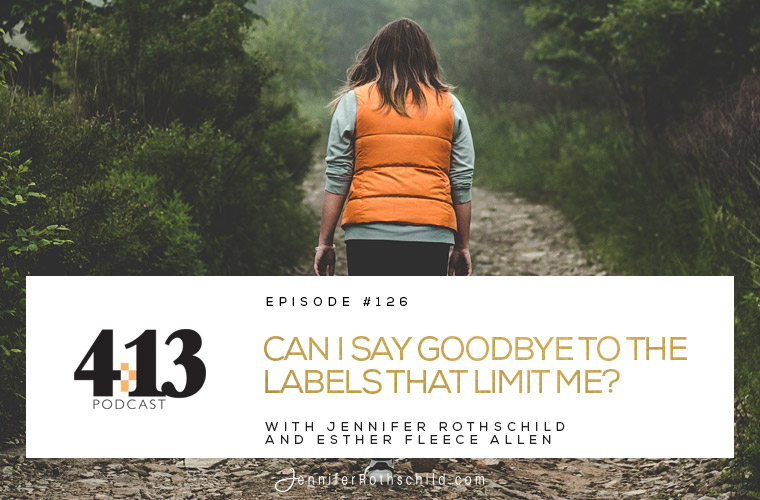
Can you imagine that for most of your life, you believed the names other people gave you? Labels like “orphan,” “no good,” and “unlovable.”
That was author Esther Fleece Allen’s life, but no more! She’s learned how to say “goodbye” to the labels that limited her. And, on this episode of the 4:13 Podcast, she shares with you the life-giving truth that only God can give you a new name.
If you haven’t met Esther yet, you’re going to love her! Esther’s newest book is called, Your New Name: Saying Goodbye to Labels That Limit, and it’s so good. CNN has called her one of “five women to watch in religion.” USA Today has named her one of the “new faces of evangelicalism,” and Christianity Today has called her “one of the 50 women shaping the church and culture.” She’s a graduate of the Oxford Center of Christian Apologetics and is currently in seminary. Esther’s favorite new names are “wife” and “mama.”
So, start peeling off those old labels because truth is on the way. Sister, the names God has for you declare freedom from your past and hope for your future!
How to Say Goodbye to the Labels That Limit You
- Fight to forgive. Esther vulnerably shares about the pain she felt when, first, her father and, then later, her mother abandoned her as a middle-school-aged girl. But, she says God met her in those hurt and wounded places in her single years, as she intentionally sought to heal through counseling and fighting to forgive.
What were the steps Esther took to forgive? She says that while it is part of our responsibility as Christians to forgive, it’s not easy, and most of the time, it’s not overnight. She says there’s no checklist or formula on how to do it. It’s a messy process—and the memories often continue to haunt us. The majority of the time, we have to forgive again and again and again.
She also clarifies that ongoing forgiveness doesn’t mean that you continue to let someone wrong you. It merely means that you may have memories and the pain that accompanies them come back, and when you do, you have to continue to forgive. As a pastor friend of hers says, “We are called to unconditionally forgive and not unconditionally reconcile.”
- Choose to lament. Full forgiveness can’t happen, though, until you first lament or grieve. Esther says that for years she minimized her abuse, minimized her pain, and minimized the abandonment. As she did, she wondered, “Why haven’t I fully forgiven?” But then she realized that if she was minimizing her story to a 3, she was only forgiving at a 3.
It’s important that we take the full weight of our pain to God and say, “This is what happened to me. This is how I’m feeling.” Or that we take our laments to Him, asking the tough questions: Where were you, God? How could you let this happen, God? Do you love me still, God? When we take our Level 10 pain to God, He meets us with a Level 10 response of healing.
When we take our Level 10 pain to God, He meets us with a Level 10 response of healing. [Click to Tweet]A great example of this in Scripture is Joseph in the Book of Genesis in the Old Testament. His family abandoned him. And it was only after Joseph wept or lamented (Genesis 43:30) that he was able to forgive his brothers, as well as recognize where God allowed certain circumstances (Genesis 45:4-15). But, Esther says, it was after grief. Joseph didn’t skip over lamenting.
- Reject lying labels. In her laments, Esther asked God, “Why was I orphaned? Why was I abused? Why was I abandoned?” He responded by reminding her, “But I adopted you. I chose you. I set you in families.” She says that when those lying labels taunt her, saying that she’s unwanted or unadoptable, she goes back to that moment with God and His truth.
But it’s not always easy to recognize the labels that limit us. When we have thoughts like “I’m a failure” or “I’m too broken,” we have a tendency to think they aren’t that big of a deal. But we need to be on the offense and ask ourselves: What label am I hearing or believing about myself? We have an accuser who’s lying to us about who we are and about who God is.
So, when we hear and are tempted to believe those labels that limit us, we can ask God to help us. Asking Him for help isn’t a sign of weakness. Instead, Esther states, “It’s a sign of faith in God that we depend on Him for these truth claims and to live out of who He says we are.”
- Find identity in God. Esther says that God doesn’t just want to show us the label that might be lying to us or holding us back. He also wants to speak truth to us about who we are—that we are seen and loved by Him. God renames us out of His love for us, not out of our worst days, sin and shame, or limitation.
And, Esther says it’s important we don’t rename ourselves. That’s what Naomi in the Book of Ruth in the Old Testament did. Naomi’s name meant sweet or pleasant. But, in the grief she experienced after the death of her husband and sons, Naomi renames herself. She tells others to call her Mara, which means bitter (Ruth 1:20-21).
Scripture doesn’t give us permission to rename ourselves. Instead of renaming ourselves in the middle of a trial or the middle of difficulty, we need to go back to God’s Word. Our identity is to be rooted in who God says we are.
Friend, God is our Healer. He empowers us and gives us grace, but it often takes work from us too. So believe He has more for you! Get honest with Him about your pain, your healing, and if you need to forgive.
And remember, you can come through a difficult time without taking a “lying label” as your new name because you can do all things through Christ who gives you strength.
Related Resources
Books & Bible Studies by Jennifer Rothschild
- Invisible: How You Feel Is Not Who You Are
- Me, Myself, & Lies: What to Say When You Talk to Yourself
- Me, Myself, & Lies: A Thought Closet Makeover Bible Study
More from Esther Fleece Allen
- Esther’s website
- Your New Name: Saying Goodbye to Labels That Limit
- Follow Esther on Facebook, Twitter, and Instagram
Links Mentioned in This Episode
Stay Connected
- Don’t miss an episode! Subscribe to the 4:13 Podcast here.
- Were you encouraged by this podcast? Reviews help the 4:13 Podcast reach more women with the “I can” message. Click here to leave a review on iTunes.



